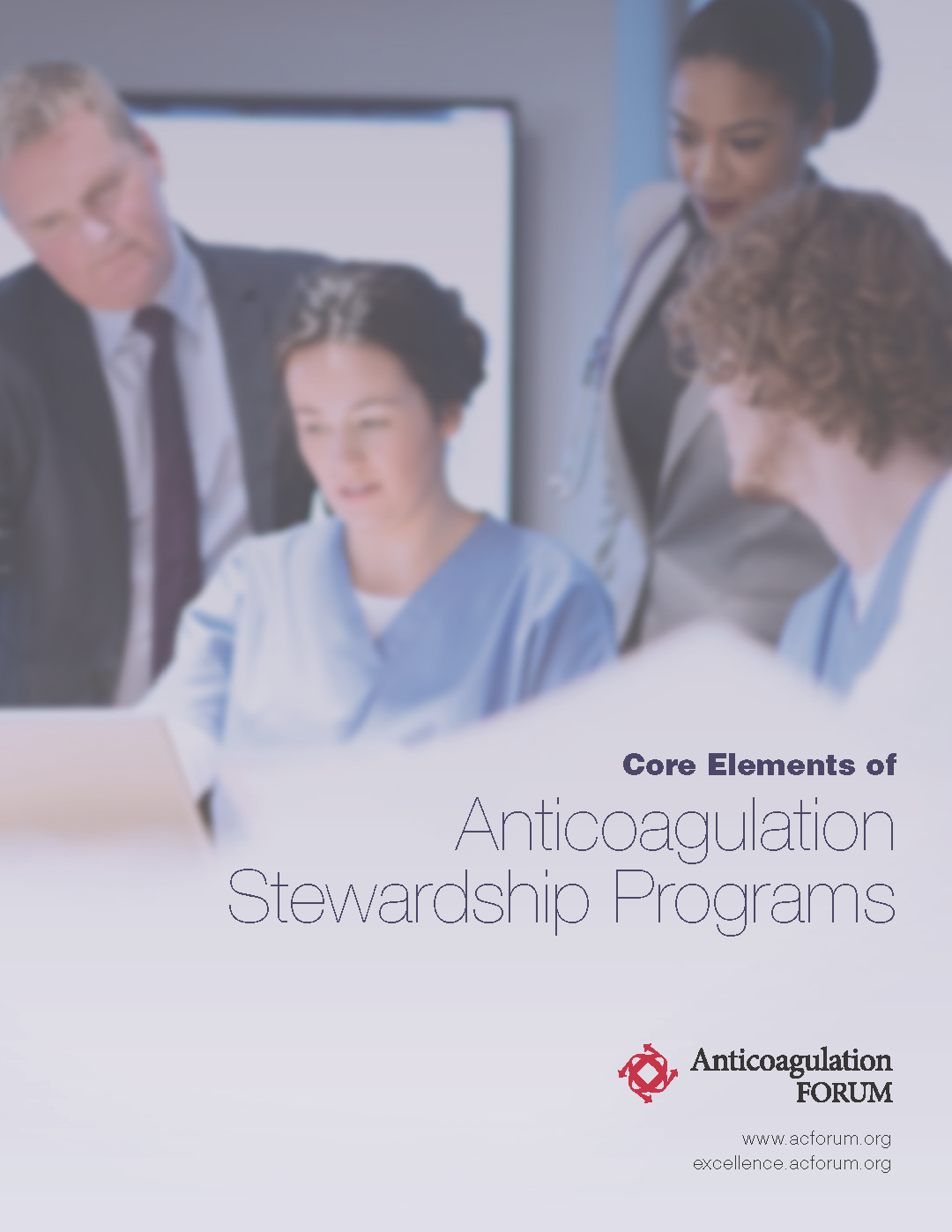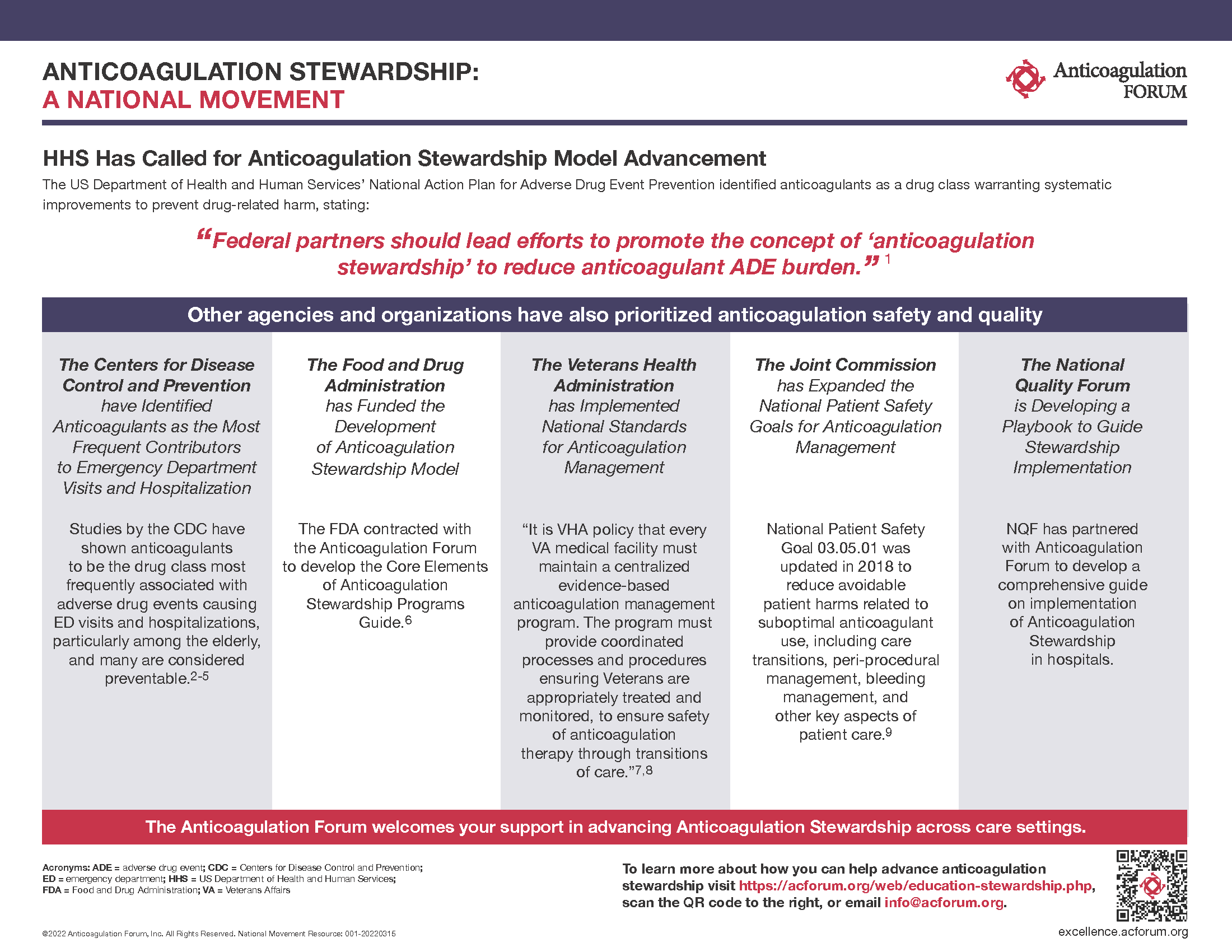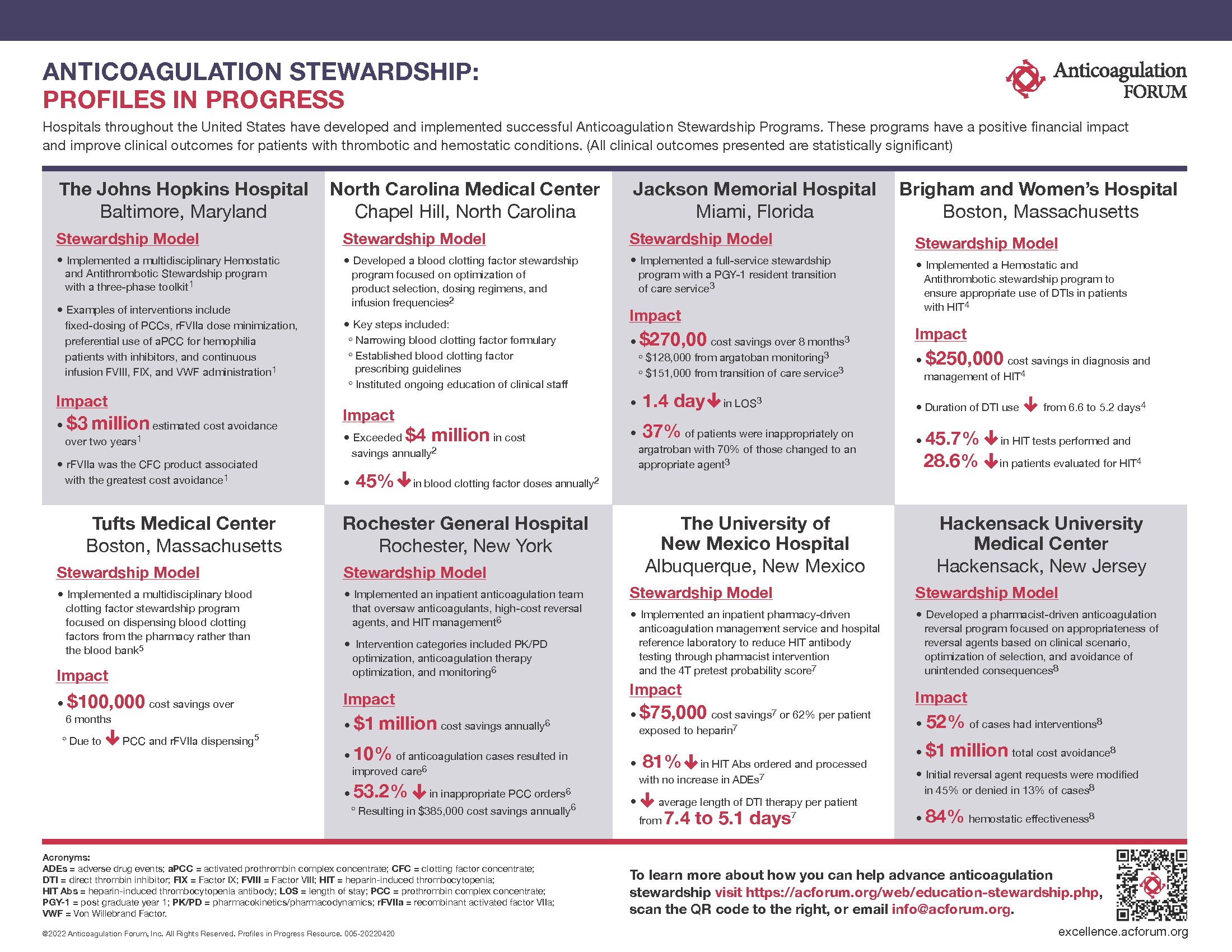 Contents
Contents
Anticoagulation Stewardship Overview
Core Elements of Anticoagulation Stewardship & Assessment Checklist
Advancing Anticoagulation Stewardship: A Playbook
Anticoagulation Stewardship Advocacy Resources
Publications & Education
Webinars
Guidelines & Regulatory Efforts Supporting Anticoagulation Stewardship
AC Forum Stewardship Initiatives
 Anticoagulation Stewardship
Anticoagulation Stewardship
Anticoagulation Stewardship is a multidisciplinary, holistic approach to anticoagulation management that spans the continuum of care. It includes coordinated, efficient, and sustainable patient-, clinician-, and system-level initiatives designed to achieve optimal anticoagulant-related health outcomes and minimize avoidable adverse drug events through the:
- Application of optimal evidence-based care
- Appropriate prescribing, dispensing, and administration of anticoagulants and related agents
- Provision of appropriate patient monitoring and clinical responsiveness
Why Invest in Stewardship?
Anticoagulants are proven life-saving therapies for individuals with cardiac and vascular disorders, however, despite positive health outcomes, there are known risks associated with anticoagulant medication. Therefore, improving the systematic management of anticoagulants within and across care settings must be a key priority.
 Core Elements of Anticoagulation Stewardship & Assessment Checklist
Core Elements of Anticoagulation Stewardship & Assessment Checklist
Secure Administrative Leadership Commitment
Dedicating necessary human, financial, and technology resources
Establish Professional Accountability and Expertise
Appointing a single leader responsible for program outcomes, supported by at least one clinician with expertise in anticoagulation management
Engage Multidisciplinary Support
Involving key specialists and disciplines to obtain perspective from all domains of the care delivery system
Perform Data Collection, Tracking, and Analysis
Defining the population, objectively evaluating performance, and guiding decision-making
Implement Systematic Care
Implementing sustainable, efficient, evidence-based action(s) at the system level to assure the safety and quality of anticoagulant management
Facilitate Transitions of Care
Creating systems to optimize communication and ensure safe transitions between care settings
Advance Education, Comprehension, and Competency
Assuring that clinicians, patients, and others have the knowledge and skills necessary to optimize outcomes
The Core Elements of Anticoagulation Stewardship Programs Guide & Assessment Checklist
outlines systemic protocols designed to improve the safety and quality of patient care and reduce adverse drug events associated with anticoagulants.The Anticoagulation Stewardship Programs guide is intended to be applicable to all care settings and all anticoagulation patient populations. By implementing effective, evidence-based system improvements to address high-priority concerns, all care settings can optimize the quality and safety of anticoagulant use and overall patient management.
The Core Elements of Anticoagulation Stewardship Programs
guide includes a supporting checklist as a tool for health systems to evaluate their current environment and identify areas warranting action. Healthcare teams can use this checklist to determine if essential support, resources, and initiatives are in place for optimal management of patients on anticoagulation medications.As each healthcare setting is unique, implementation of checklist elements may need to be customized, based on infrastructure and access to resources.

The Anticoagulation Stewardship Playbook was developed in partnership with the National Quality Forum (NQF) and through funding provided by the FDA.
This playbook provides in-depth guidance and concrete strategies for incorporating the Seven Core Elements of Anticoagulation Stewardship in your organization. Each section includes a detailed description of the core element; establishing, strengthening, and sustaining implementation strategies; potential barriers and suggested solutions; and links to relent tools and resources.
In our background and introduction, we discuss the National Urgency for Safe Anticoagulant Use, coordinated national approaches to promote anticoagulation safety, and how to use anticoagulation stewardship to drive improvement in quality and safety.
Our goal is for individuals to use this Playbook as a tool to help address common barriers and accelerate adoption of Anticoagulation Stewardship programs on the national scale.
About the National Quality Forum
The National Quality Forum (NQF) works with members of the healthcare community to drive measurable health improvements together. NWF is a not-for-profit, membership-based organization that gives all healthcare stakeholders a voice in advancing quality measures and improvement strategies that lead to better outcomes and greater value. Learn more at www.qualityforum.org.
Improving Anticoagulation Stewardship: Using Population Health-Based Digital Tools
New September 2023
This document provides detailed descriptions of various population health-based digital tools and includes several suggestions for how health systems can help advance anticoagulation stewardship.
Download a printable version here.
CODE RED! Anticoagulant-Related Emergency Department Visits Surge!
July 2023
This document presents key findings from serial studies from the US Centers for Disease Control and Prevention and calls for national standards on anticoagulation-related quality and safety. Designed to advance Anticoagulation Stewardship conversations with key stakeholders.
Anticoagulation Stewardship: A National Movement
May 2022
Describes how Anticoagulation Stewardship is gaining momentum at the national level and profiles key steps taken by federal agencies and others to advance the concept.
Access the complete companion bibliography for this document here.
Anticoagulation Stewardship: Evidence of Impact
May 2022
Profiles gaps in the quality of anticoagulant-related care and their association with adverse outcomes. It also highlights how well-designed stewardship activities can generate significant improvements.
Access the complete companion bibliography for this document here.
Anticoagulation Stewardship: Profiles in Progress
May 2022
Highlights the clinical and financial successes of eight hospitals that have published manuscripts on their stewardship implementation models.
Access the complete companion bibliography for this document here.
New: Securing Administrative Leadership Commitment for Anticoagulation Stewardship Programs (Dec. 2023)
Jori May | Darren Triller | Lauren Inglis | Anne Rose | Vicky DiLorenzo-Agramonte | Allison Burnett | Glen Schumock | Scott Kaatz | Geoffrey Barnes | Jack Ansell
Securing administrative leadership support for Anticoagulation Stewardship programs is often a significant barrier to implementation. This manuscript presents a structured approach to guide clinicians advocating to leadership for stewardship programs at their institutions.
A Call to Action for Anticoagulation Stewardship (July 2022)
Allison Burnett | Geoffrey Barnes
Highlights the need for anticoagulation stewardship in order to prevent the growing number of anticoagulation-related
adverse drug events, including life-threatening bleeding and thrombotic complications.
Administrative Oversight Gap Analysis: Hospitals and Skilled Nursing Facilities (2019)
Anticoagulation Forum
Identifies gaps & offers recommendations to improve regulations and quality measures to increase safety and the quality of care in hospitals and skilled nursing facilities.
Advancing Anticoagulation Stewardship: A Playbook (2022)
Anticoagulation Forum & National Quality Forum
Centers on the Anticoagulation Forum’s Core Elements of Anticoagulation Stewardship and offers concrete strategies and implementation examples for healthcare organizations and clinicians who wish to create, promote, and sustain an Anticoagulation Stewardship program.
Advancing Anticoagulation Stewardship: A Call To Action For Stewardship From The US-based Anticoagulation Forum (Dec. 2022)
Allison Burnett | Kelly M. Rudd | Darren Triller
Anticoagulation Stewardship is urgently needed to improve anticoagulation management and bend the current, negative trajectory on anticoagulation-related harm. This manuscript catalogs the origins and the progression of the Anticoagulation Stewardship model and serves as a call to action for healthcare providers and organizations committed to improving the quality and safety of anticoagulation management.
Anticoagulation Stewardship Advocacy: Evidence of Impact (May 2022)
Anticoagulation Forum
Profiles gaps in the quality of anticoagulant-related care and their association with adverse outcomes. It also highlights how well-designed stewardship activities can generate significant improvements.
Anticoagulation Stewardship Advocacy: Profiles in Progress (May 2022)
Anticoagulation Forum
Highlights the clinical and financial successes of eight hospitals that have published manuscripts on their stewardship implementation models.
Anticoagulation Stewardship Advocacy: A National Movement (May 2022)
Anticoagulation Forum
Describes how Anticoagulation Stewardship is gaining momentum at the national level and profiles key steps taken by federal agencies and others to advance the concept.
Core Elements of Anticoagulation Stewardship (2019)
Anticoagulation Forum
Describes how Anticoagulation Stewardship is gaining momentum at the national level and profiles key steps taken by federal agencies and others to advance the concept.
Checklist for Core Elements of Anticoagulation Stewardship Programs (2019)
Anticoagulation Forum
Tool for health systems to evaluate their current environment, identify areas warranting action and determine if essential support, resources, and initiatives are in place for optimal management of patients on anticoagulation medications.
Creation of a Novel Specialty Residency in Thrombosis and Hemostasis Management (Oct. 2022)
Lauren Ingles | Darren Triller | Allison Burnett | Jessica Grandoni | Lina Matta | Katelyn Sylvester | William E. Dager | Michael P. Gulseth | John Fanikos
Describes the evolution of the PGY2 in thrombosis & hemostasis management at Brigham and Women’s Hospital in Boston, MA. Developed with contributions from multiple centers across the country, this paper sets forth a vision for the spread and sustainability of the specialty nationally.
Impact of Hospital-based Multidisciplinary Anticoagulation Stewardship Programs (Jan. 2023)
Mateo Porres-Aguilar | Jack Ansell | Debabrata Mukherjee | Xóchitl Cota-Rangel | Ricardo Martínez-Zubieta | Raúl Carrillo-Esper | Allison Burnett
A joint publication by the Anticoagulation Forum and Sociedad Mexicana de Trombosis y Hemostasia (Mexican Society of Thrombosis and Hemostasis) this article discusses the critical need for antithrombosis stewardship and the benefit of formalized multidisciplinary anticoagulation stewardship programs in optimizing the use of antithrombotic therapies.
DOAC stewardship is an essential need. In a recent paper, the CDC estimated between 2016-2020 there were 1.2 million emergency room visits due to oral anticoagulant-related bleeding. To mitigate risks associated with DOACs, different management models have been constructed and established across institutions and clinics worldwide. Join experts as they discuss a patient-focused DOAC model similar to warfarin management at Brigham & Women’s Hospital as well as a population health model used across VHA. A question-and-answer panel will address the value of DOAC oversight by anticoagulation services.
Speakers:
Katelyn Sylvester, PharmD, BCPS, CACP
Arthur Allen, PharmD, CACP
CDR Andrew Geller, MD
Jean Connors, MD
Andrea Van Beek, RN, DNP, AGPCNP-BC
The Anticoagulation Forum, in partnership with the National Quality Forum (NQF), and with funding from the U.S. Food and
Drug Administration (FDA), is pleased to announce the release of "Advancing Anticoagulation Stewardship: A Playbook", a
new, publicly available guide to help healthcare organizations implement evidence-based strategies to promote patient
safety in the use of anticoagulant medications. This Playbook centers on the Anticoagulation Forum’s Core Elements of
Anticoagulation Stewardship and offers concrete strategies and implementation examples for healthcare organizations and
clinicians who wish to create, promote, and sustain an Anticoagulation Stewardship program.
Join key authors and contributors as they discuss the Playbook creation process and how best to use this new tool to
advance stewardship at your practice.
Speakers:
Arthur Allen, PharmD, CACP
Allison Burnett, PharmD, PhC, CACP
Scott Kaatz, DO, MSc, FACP, SFHM
Chelsea Lynch, MPH, MSN, RN, CIC
Scott K. Winiecki, MD
In this webinar, Dr. Burnett defines anticoagulation stewardship and describes practice-level initiatives and national-level momentum behind these types of programs. She also discusses the role of pharmacists within the multidisciplinary team to promote anticoagulation stewardship for VTE patients throughout the continuum of care. Finally, she summarizes relevant clinical resources to aid clinicians in optimizing the care of VTE patients.
Part of the CDC’s Public Health Webinar Series on Blood Disorders.
Speakers:
Allison E. Burnett, PharmD, PhC, CACP
Caroline Cromwell, MD
Join us for a discussion about successful Anticoagulation Stewardship Program implementation. Dr. Daniel Budnitz from the CDC will describe his work quantifying AC-related harms over the years and where he sees the future going as a public health priority, touching upon his publication “US Emergency Department Visits Attributed to Medication Harms, 2017-2019”.
Stewardship teams from both Johns Hopkins Hospital and the University of Alabama at Birmingham will follow Dr. Budnitz and share their experiences implementing AC stewardship programs at their institutions. A panel will continue the conversation, opening questions to participants.
Speakers:
Dan Budnitz, MD, MPH, CAPT, USPHS
Kathryn Dane, PharmD
Scott Kaatz, DO, MSc, FACP, SFHM
Jori May, MD
Anne Rose, PharmD
Michael Streiff, MD
Andrea Van Beek, RN, DNP, AGPCNP-BC
Core Elements of Anticoagulation Stewardship Programs
October 30, 2019
Explores how the Core Elements of Anticoagulation Stewardship guide and other AC Forum resources can be leveraged to advance anticoagulation stewardship principles in a variety of patient care settings.
Speakers:
Allison E. Burnett, PharmD, PhC, CACP
Scott Kaatz, DO, MSc, FACP, SFHM
Tracy Minichiello, MD
Darren Triller, PharmD
U.S. Department of Health and Human Services National Action Plan for Adverse Drug Event Prevention
The Department of Health and Human Services’ National Action Plan for Adverse Drug Event [ADE] Prevention reports that anticoagulation therapy is underutilized in the patient populations for whom it is most beneficial. It further encourages that future public health initiatives will need to foster a comprehensive approach that addresses both anticoagulant effectiveness and safety.
The Joint Commission National Patient Safety Goals Update [NPSG 03.05.01]
The Joint Commission revised National Patient Safety Goal [NPSG] 03.05.01 in response to a rise in adverse drug events associated with direct oral anticoagulants [DOACs], effective July 1, 2019.
The Joint Commission believes that the eight new elements of performance, expected to apply to all Joint Commission-accredited hospitals, critical access hospitals, nursing care centers, and medical centers [accredited under the ambulatory health care program], may help reverse this trend.
Thrombosis/Hemostasis Residency Award & Innovation Network (TRAIN) PGY2 Pharmacy Residency
2022-2026
This residency program, authorized by ASHP, aims to support the creation of anticoagulation stewardship programs nationwide by increasing the number of expert clinicians equipped to effectively manage patients at risk for thrombosis and bleeding.
Learn More.
Oral Anticoagulation Surveillance and Improvement Through Stewardship (OASIS) Program
2022-2024
The MIDAS Program is a 24-month project, funded by the FDA, though which the Anticoagulation Forum will assess hospital needs specific to DOAC prescribing surveillance processes and interventions.
By the end of 2024, this information will be used to develop, implement, and evaluate an EHR-based DOAC Dashboard that will be made publicly available through EPIC Turbocharger.
Mentored Implementation and Dissemination of Anticoagulation Stewardship (MIDAS) Program
2020-2022
The MIDAS Program was a 24-month project, funded by the FDA, through which five hospital sites were paired with nationally recognized anticoagulation experts. These mentors worked directly with care teams to use the Core Elements of Anticoagulation Stewardship to assess their stewardship baseline, identify interventional targets, develop an implementation strategy, and track program progress.
Information obtained from this process was used to develop “Advancing Anticoagulation Stewardship: A Playbook,” which provides guidance and resources to hospitals that wish to independently establish a stewardship program.






.jpg)











